Camera Maintenance Checklist: Ultimate Essential 2025
{“@context”: “https://schema.org”, “@graph”: [{“@type”: “Article”, “headline”: “Camera Maintenance Checklist 2025 | TechPro Security”, “description”: “Ensure your cameras perform flawlessly with our camera maintenance checklist. Protect your investment and keep security tight. Read now for essential tips.”, “author”: {“@type”: “Person”, “name”: “Skyler Libkie”}, “publisher”: {“@type”: “Organization”, “name”: “TechPro Security”, “logo”: {“@type”: “ImageObject”, “url”: “https://cdn-ilaoanp.nitrocdn.com/dvQsIYlpmfGsOdTGBqLLiEBFgcxkRtmy/assets/images/optimized/rev-059c08c/www.techprosecurity.com/wp-content/uploads/2024/04/cropped-techpro-fav-192×192.jpg”}}, “datePublished”: “2025-07-08T10:00:19+00:00”, “dateModified”: “2025-07-08T14:00:28.344799”, “mainEntityOfPage”: {“@type”: “WebPage”, “@id”: “https://techprosecurity.com/security-articles/access-control-and-security/camera-maintenance-checklist/”}, “image”: “https://images.bannerbear.com/direct/4mGpW3zwpg0ZK0AxQw/requests/000/096/252/590/APW1bDp49YKOeBPWYjmVoORax/0550341f7370c2b06eafe9e5ef6584f57d87eade.jpg”}, {“@type”: “FAQPage”, “mainEntity”: [{“@type”: “Question”, “name”: “Why is a camera maintenance checklist critical?”, “acceptedAnswer”: {“@type”: “Answer”, “text”: “A camera maintenance checklist is critical for preventing costly repairs, extending equipment life, and ensuring reliable operation, especially for security cameras, DSLRs, and film cameras.”}}, {“@type”: “Question”, “name”: “What are the recommended camera maintenance frequencies?”, “acceptedAnswer”: {“@type”: “Answer”, “text”: “Indoor residential cameras should be maintained twice yearly, outdoor cameras require quarterly inspections, commercial systems need monthly maintenance, and film cameras should have professional servicing every 1-2 years.”}}, {“@type”: “Question”, “name”: “What tasks are included in a camera maintenance checklist?”, “acceptedAnswer”: {“@type”: “Answer”, “text”: “The checklist includes daily/weekly tasks like visual inspection and lens cleaning, monthly tasks such as housing inspection and cable checks, quarterly tasks like firmware updates, and annual tasks including professional diagnostics and sensor cleaning.”}}, {“@type”: “Question”, “name”: “What are the consequences of poor camera maintenance?”, “acceptedAnswer”: {“@type”: “Answer”, “text”: “Poor maintenance can lead to blurry footage, system failures, security vulnerabilities, and the inability to provide clear evidence during critical moments.”}}, {“@type”: “Question”, “name”: “How does regular camera maintenance benefit performance?”, “acceptedAnswer”: {“@type”: “Answer”, “text”: “Regular maintenance keeps cameras operating at peak performance, prevents system failures, and ensures cameras are reliable when needed most, similar to regular tune-ups for a car.”}}]}]}
Why Your Camera Maintenance Checklist is Critical for Security and Performance
A camera maintenance checklist is essential for keeping your security cameras, DSLRs, and film cameras operating at peak performance. Whether you’re protecting your South Florida home or capturing precious memories, regular maintenance prevents costly repairs, extends equipment life, and ensures reliable operation when you need it most.
Essential Camera Maintenance Tasks:
- Daily/Weekly: Visual inspection, lens cleaning, battery check, recording status verification
- Monthly: Housing inspection, cable checks, PTZ testing, storage health review
- Quarterly: Firmware updates, backup power testing, deep cleaning, mounting hardware inspection
- Annually: Professional diagnostics, sensor cleaning, waterproof seal replacement
Recommended Frequencies:
- Indoor residential cameras: twice yearly
- Outdoor cameras: quarterly inspections
- Commercial systems: monthly maintenance
- Film cameras: professional servicing every 1-2 years
Poor maintenance leads to blurry footage, system failures, and security vulnerabilities. A well-maintained camera system provides clear evidence, deters crime, and protects your investment for years to come.
As Brad Besner, founder of TechPro Security Products with over 15 years in the security industry, I’ve seen countless camera failures that could have been prevented with a proper camera maintenance checklist. This guide will help you protect your equipment and ensure reliable performance whether you’re securing your property or capturing life’s important moments.
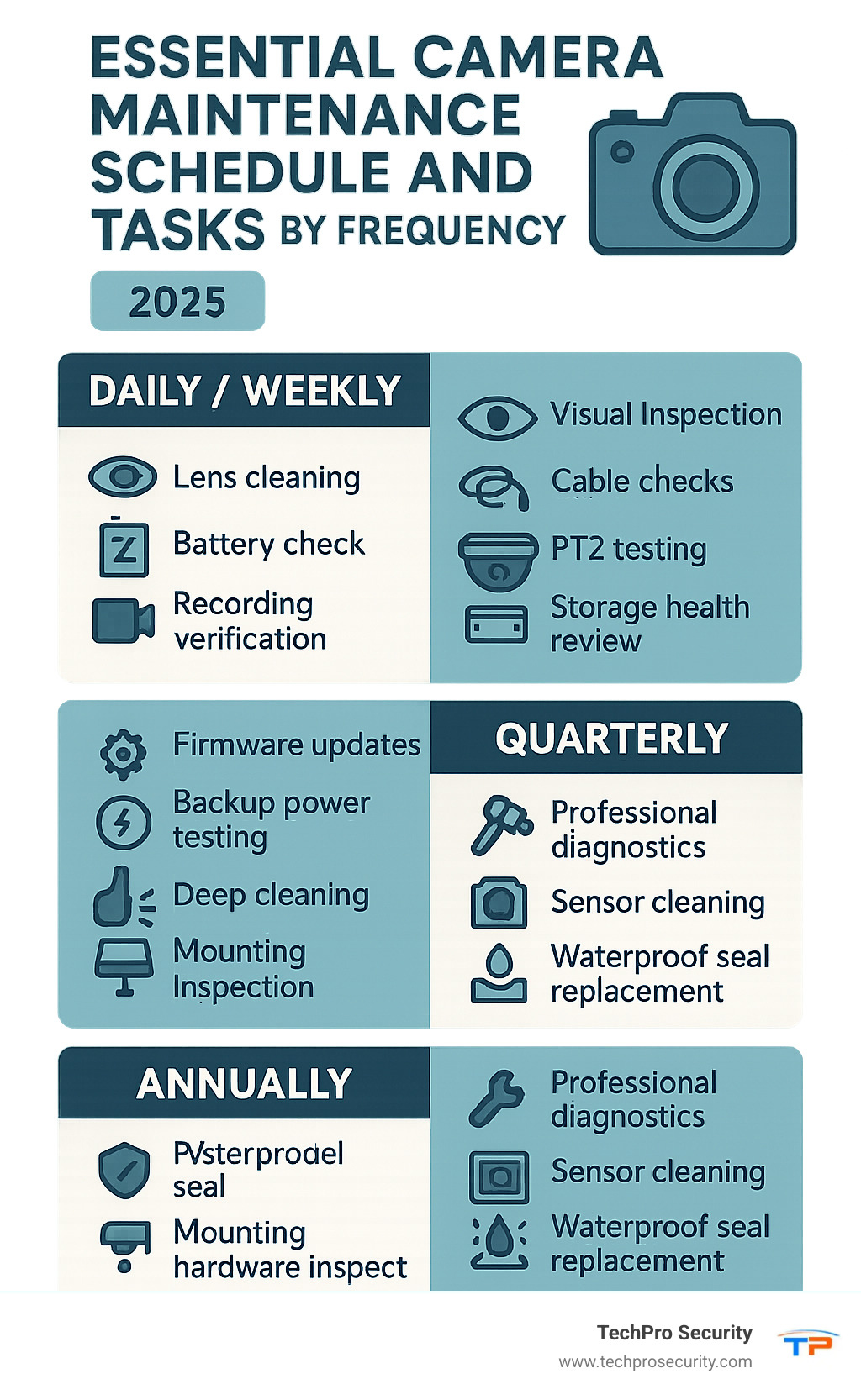
Why Regular Camera Maintenance is Essential
Think of your camera like a car – it needs regular tune-ups to keep running smoothly. I’ve learned this lesson the hard way after seeing countless security systems fail at the worst possible moments. There’s nothing quite like getting a call from a business owner who finded their cameras weren’t recording during a break-in, all because dust had built up on the lens over months of neglect.
Your cameras work harder than you think. Whether it’s a DSLR capturing your family vacation or a security camera protecting your South Florida home, these devices face constant challenges. Dust settles on lenses, moisture creeps into housings, and cables gradually deteriorate under the Florida sun. Without regular attention, even the best equipment will let you down when you need it most.
The performance benefits of following a proper camera maintenance checklist are immediate and noticeable. Your images stay crystal clear, your security footage remains reliable, and your equipment responds quickly when you need it. Most indoor residential systems need attention twice yearly, while outdoor cameras should be checked every three months due to weather exposure.
Here’s where maintenance really pays off financially. Basic CCTV maintenance typically costs $50 to $200 annually per camera – a small price compared to replacing failed equipment or dealing with the aftermath of a security breach. Commercial systems might require $1,000 to $5,000 yearly, but that’s still far less than the cost of system failure or compromised security.
Regular maintenance prevents the most common camera problems that leave property owners vulnerable. Blurry images from dust accumulation, system failures from cable deterioration, and security breaches from outdated firmware are all preventable with consistent care. PTZ cameras particularly benefit from regular attention, as their moving parts are prone to mechanical wear without proper maintenance.
Don’t forget about your warranty coverage. Most manufacturers require maintenance records to honor warranty claims. Keeping detailed documentation of your care routine protects your investment and ensures you can get coverage when equipment fails.
For more complex issues or professional guidance, our team provides comprehensive security camera repair services throughout South Florida. We’ve seen how a simple maintenance routine can save thousands in replacement costs and prevent security vulnerabilities that put your property at risk.
Peace of mind is perhaps the greatest benefit of all. When you know your cameras are properly maintained, you can trust they’ll be there when you need them most – whether that’s capturing your child’s first steps or providing crucial evidence after an incident.
The Essential Tools and Solutions for Camera Care
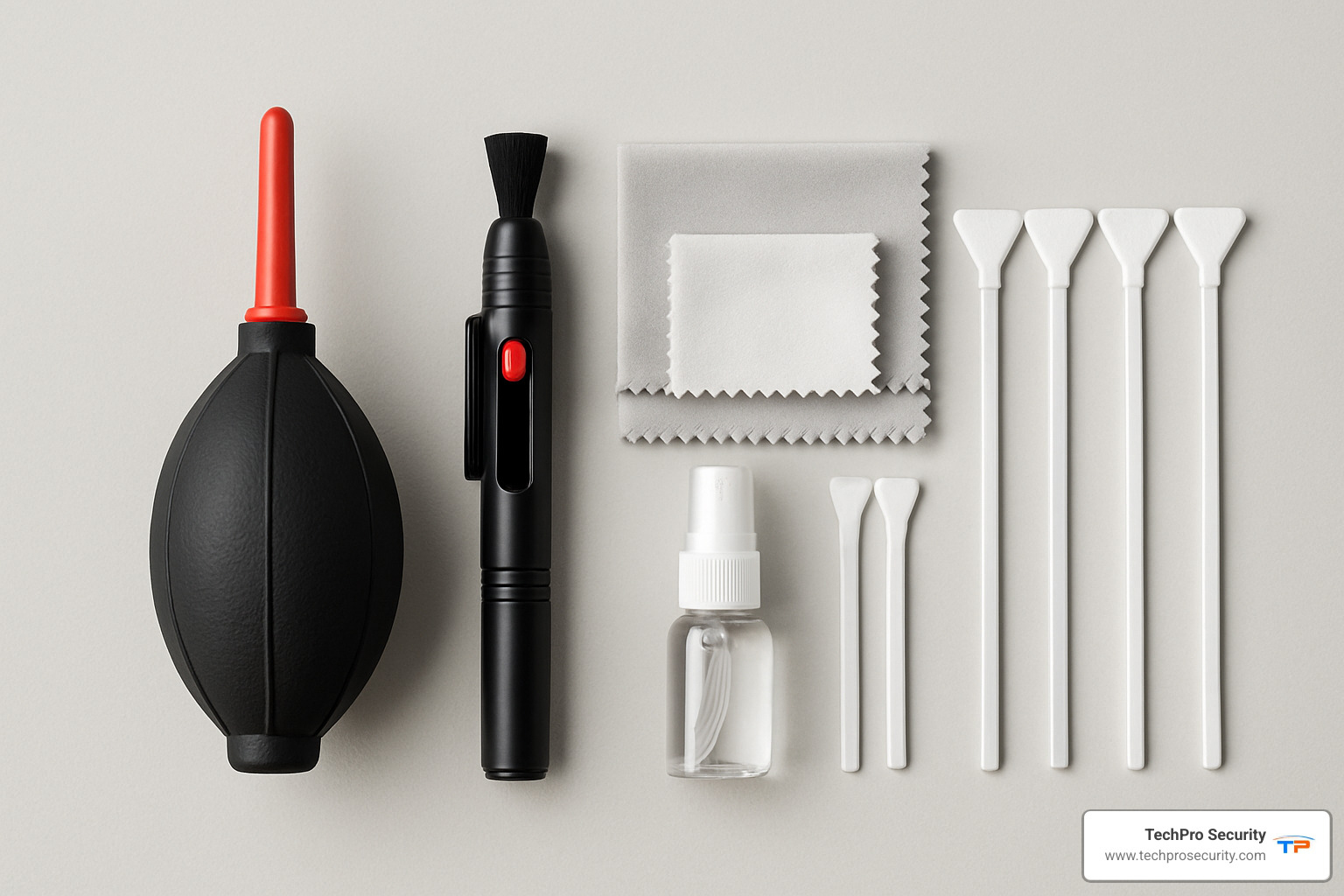
Think of your camera maintenance checklist as only being as good as the tools you use to complete it. Over the years, I’ve seen people damage expensive equipment by using the wrong cleaning supplies—like trying to clean a camera lens with a paper towel or using window cleaner on delicate coatings.
Getting the basics right starts with understanding that cameras need gentle care. An air blower should be your first line of defense against dust and debris. Unlike compressed air cans that can spray moisture, a manual blower gives you control and won’t damage sensitive components. For actually touching your equipment, microfiber cloths are essential—they’re lint-free and won’t scratch your lenses or camera body.
For field maintenance, a lens pen is incredibly handy. It combines a soft brush on one end with a cleaning tip on the other, making it perfect for quick touch-ups when you’re out shooting. If you own a DSLR, sensor swabs are specialized tools designed specifically for cleaning that delicate sensor without causing damage.
The right cleaning solutions make all the difference. Lens cleaning solution is formulated specifically for camera optics and won’t harm the special coatings on your lenses. A soft-bristled brush helps remove stubborn debris from camera bodies and security camera housings without scratching surfaces.
Professional-grade maintenance sometimes requires additional tools. Compressed air can be useful, but use it with caution—hold the can upright and use short bursts to avoid moisture damage. For vintage cameras or deep cleaning, cleaning fluid like denatured alcohol or distilled water works well, though modern cameras rarely need such intensive treatment.
Safety is crucial when cleaning any camera equipment. Never spray cleaning solutions directly onto your camera—always apply them to your cloth first. Household cleaners are a definite no-go, especially anything with ammonia, which can permanently damage lens coatings.
For reliable cleaning supplies and professional-grade equipment, micro-tools.com offers specialized tools that won’t let you down when maintaining your valuable equipment.
Your Ultimate Camera Maintenance Checklist (By Frequency)
Creating a proactive maintenance schedule based on your camera type and environment ensures optimal performance. Environmental factors like humidity, salt air, and temperature extremes significantly impact maintenance frequency.
Daily/Weekly Camera Maintenance Checklist
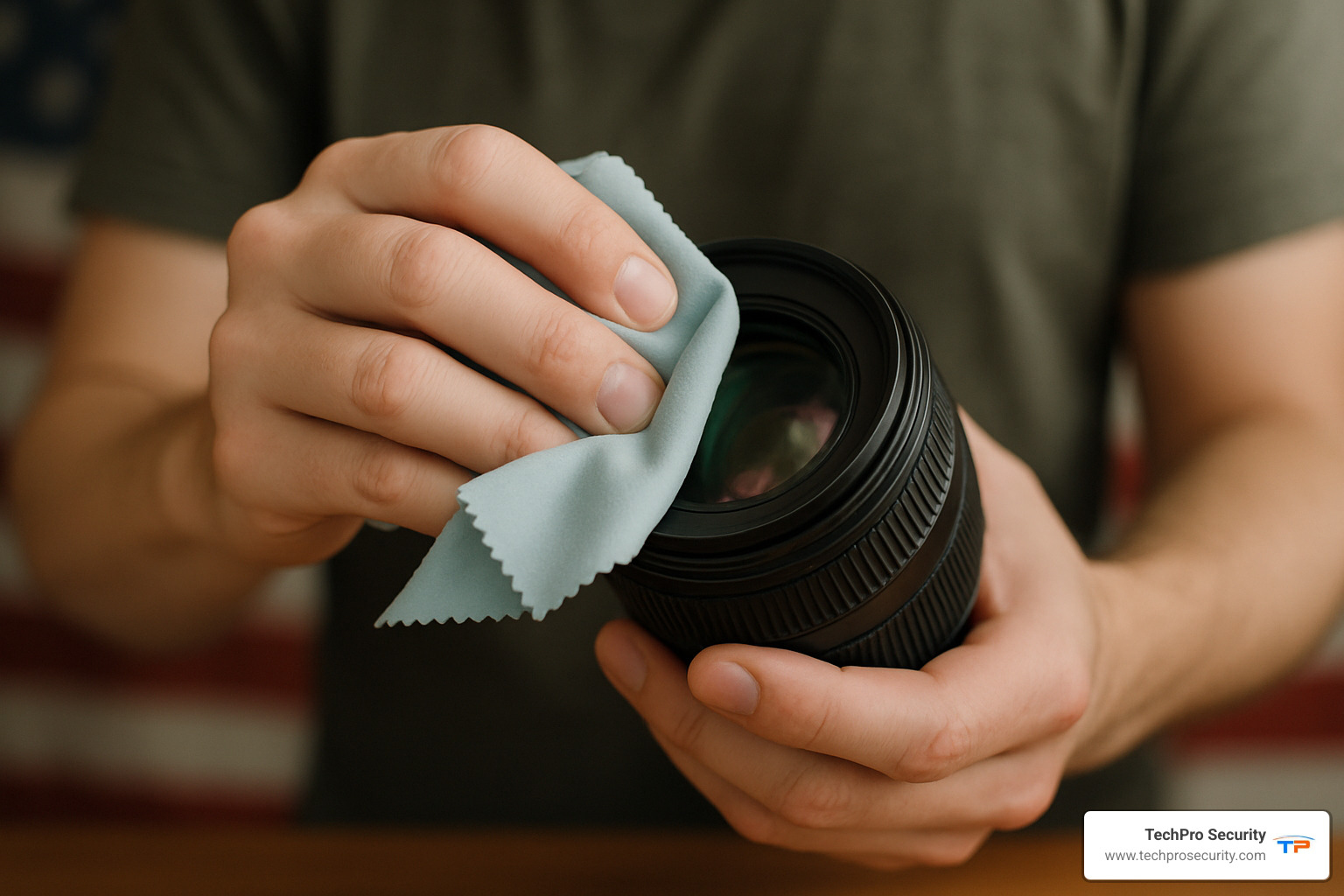
Visual Inspection Tasks:
- Check for physical damage to camera body and housing
- Verify lens cap is properly secured when not in use
- Look for obstructions like spider webs, bird nests, or vegetation
- Confirm camera positioning hasn’t shifted
Basic Cleaning:
- Clean lens with microfiber cloth using circular motions from center outward
- Wipe down camera body with slightly damp cloth
- Remove dust from viewfinder and LCD screen
- Clear any debris from camera housing vents
Operational Checks:
- Verify battery levels (camera batteries lose about 5% charge per day)
- Confirm recording status and storage availability
- Test basic camera functions (power on, date/time sync)
- Check that motion detection is functioning properly
Quick Recording Test:
Record 10-20 seconds of footage and review playback quality. This simple test can catch issues before they become major problems.
Monthly Camera Maintenance Checklist
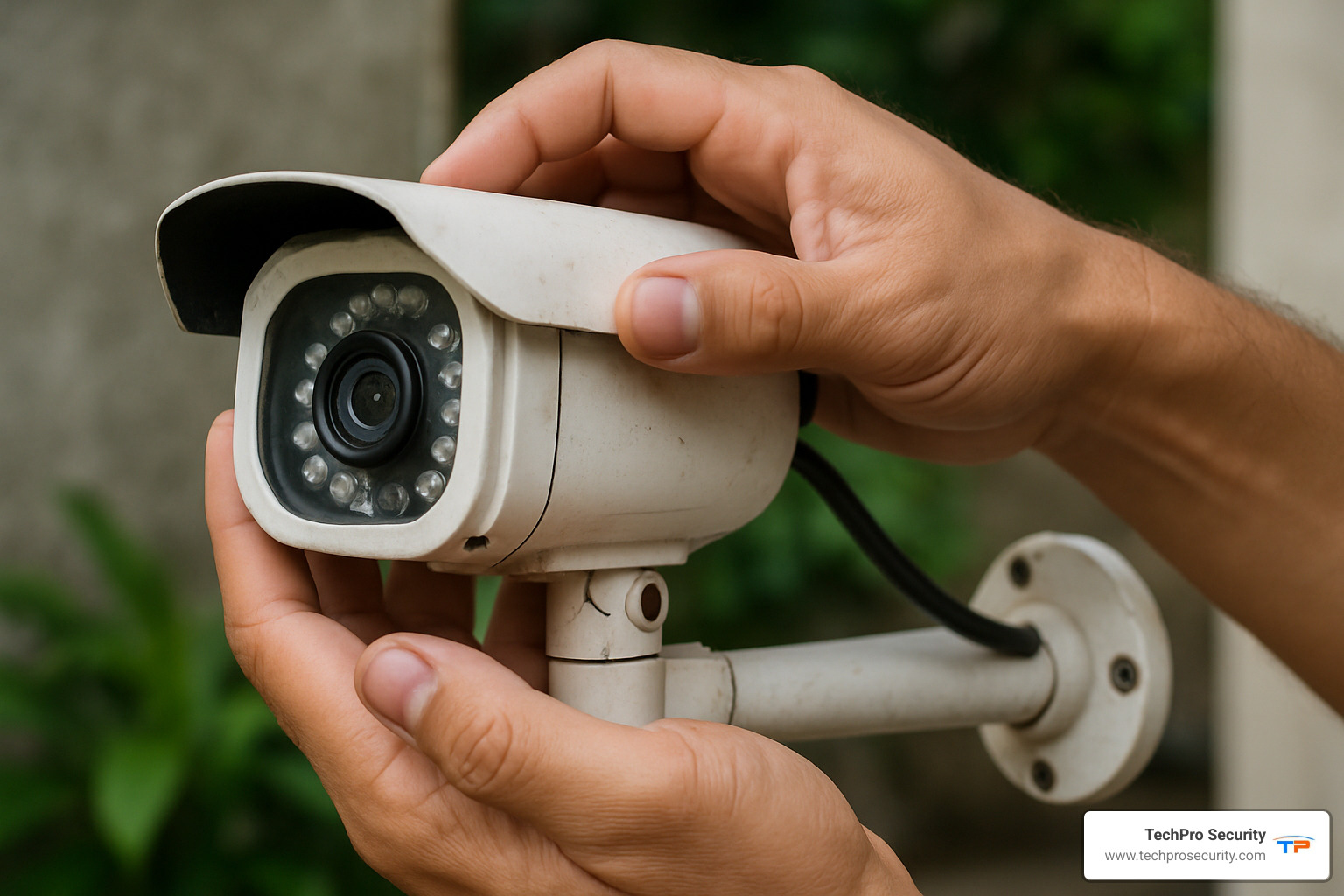
Housing and Environmental Inspection:
- Inspect camera housing for cracks, water damage, or corrosion
- Check weatherproof seals and reapply silicone if needed
- Remove any insect nests or debris buildup
- Verify mounting hardware is secure and properly aligned
Cable and Connection Maintenance:
- Inspect all cables for wear, fraying, or damage
- Check BNC/Ethernet connections for corrosion
- Ensure all connectors are securely fastened
- Test cable integrity with transmission tests
System Function Testing:
- Perform comprehensive PTZ testing (pan, tilt, zoom functions)
- Test focus adjustments and image clarity
- Verify field of view covers intended areas
- Check for any blind spots or coverage gaps
Storage and Recording Health:
- Review storage capacity and delete old recordings
- Verify backup systems are functioning
- Check recording quality in various lighting conditions
- Test playback functionality
For detailed information about PTZ camera functionality and maintenance, visit PTZOptics for technical specifications.
Quarterly & Bi-Annual Tasks
Software and Firmware Updates:
- Check for and install latest firmware updates
- Apply security patches promptly
- Update camera software and mobile apps
- Verify all system settings after updates
Power System Maintenance:
- Test backup power systems (UPS units)
- Check battery backup duration and capacity
- Inspect power supply connections
- Measure voltage levels with a multimeter
Deep Cleaning Tasks:
- Perform thorough cleaning of camera body and housing
- Clean internal components (following manufacturer guidelines)
- Inspect and clean ventilation systems
- Remove any corrosion from metal components
System Synchronization:
- Verify date and time settings across all cameras
- Check network connectivity and remote access
- Test alert and notification systems
- Calibrate motion detection sensitivity
For reliable backup power solutions, explore Uninterruptible Power Supplies options.
Annual Professional Check-Up
Comprehensive System Diagnostics:
- Full system performance evaluation
- Power supply testing and calibration
- Network security assessment
- Storage system health check
Professional Cleaning Services:
- Sensor cleaning for DSLR cameras
- Internal mechanism inspection
- Shutter mechanism testing and adjustment
- Professional lens calibration
Hardware Inspection:
- Check for component wear and tear
- Inspect mounting hardware and brackets
- Test all mechanical moving parts
- Replace worn gaskets and seals
Preventive Maintenance:
- Apply fresh waterproof seals to outdoor cameras
- Lubricate mechanical components (if applicable)
- Replace aging cables and connectors
- Update security credentials and passwords
For professional maintenance services in South Florida, our CCTV maintenance team provides comprehensive annual inspections and servicing.
Specific Maintenance for Different Camera Types
Every camera type has its own personality and needs – kind of like caring for different pets! Your security camera requires different attention than your DSLR, and that vintage film camera needs special TLC. Understanding these differences helps you create the perfect camera maintenance checklist for your specific equipment.
| Camera Type | Key Maintenance Focus | Frequency | Special Considerations |
|---|---|---|---|
| CCTV/Security | Housing, cables, network security | Monthly | Weather exposure, 24/7 operation |
| DSLR/Mirrorless | Sensor, lens mount, battery contacts | Weekly | Dust from lens changes, mechanical wear |
| Film Cameras | Light seals, mechanical parts | Every 1-2 years | Age-related deterioration, lubrication needs |
CCTV Camera Considerations
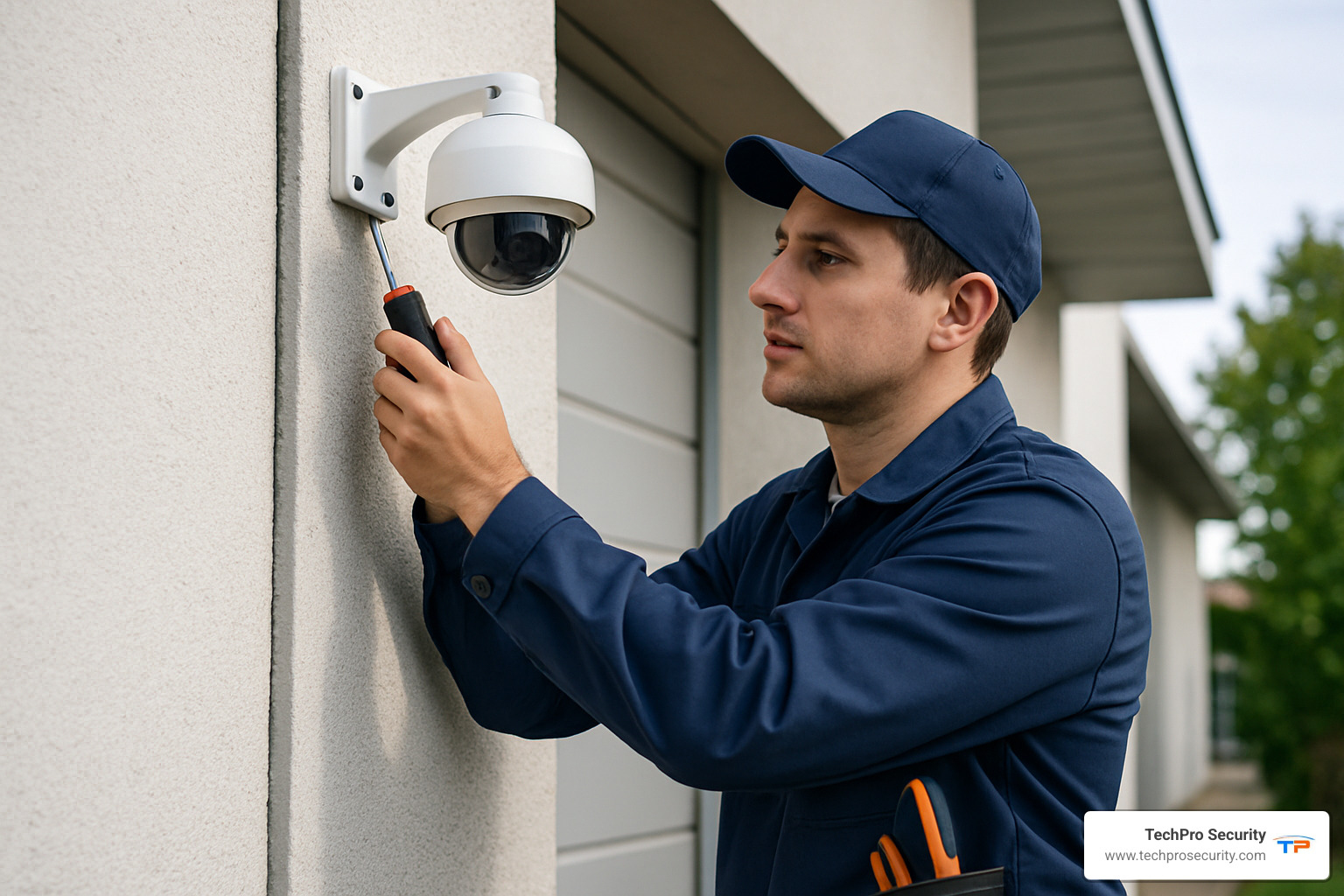
Security cameras are the workhorses of the camera world – they’re out there 24/7, rain or shine, keeping watch over your property. This constant duty means they need regular attention to stay sharp and reliable.
Outdoor cameras face unique challenges from South Florida’s humid climate, salt air, and intense sun. Check those weatherproof housings monthly for any signs of moisture getting where it shouldn’t. Even tiny water droplets can fog up your lens or damage electronics over time.
Lens alignment is crucial for maintaining proper coverage. A camera that’s shifted even slightly can create blind spots that compromise your security. Test your field of view regularly and adjust positioning if needed. Don’t forget to check those infrared illuminators – they’re what keep your cameras seeing clearly in the dark.
Network security maintenance is just as important as physical cleaning. Update those default passwords regularly (yes, even if they’re hard to remember!). Check for firmware updates and security patches that protect against cyber threats. Your camera system is only as strong as its weakest digital link.
DVR and NVR systems need breathing room to stay cool. Clean those ventilation fans and air filters regularly – overheating is one of the fastest ways to kill expensive recording equipment. Monitor your storage capacity too, because running out of space means missing important footage.
Commercial facilities can’t afford downtime, which is why businesses need monthly maintenance schedules. For comprehensive commercial security camera maintenance in South Florida, professional servicing ensures your business stays protected around the clock.
DSLR & Mirrorless Camera Care
DSLR and mirrorless cameras are precision instruments that reward careful maintenance with years of reliable service. These cameras face unique challenges from frequent lens changes, which can introduce dust into the camera body.
Sensor cleaning is probably the most intimidating maintenance task for photographers, but it’s not as scary as it seems. Use your camera’s sensor cleaning mode to lock up the mirror and open the shutter safely. Only clean when you actually see dust spots in your images – unnecessary cleaning can cause more problems than it solves.
Lens mount contacts are those small metal pins that allow your camera and lens to communicate. Keep them clean with a dry cloth, and they’ll continue providing accurate autofocus and exposure information. Never use liquids on these contacts – moisture and electronics don’t mix well.
Battery terminals can develop corrosion over time, especially in humid climates. Clean them gently with a dry cloth, and always remove batteries during long-term storage. Those little white or green deposits might look harmless, but they can prevent your camera from powering on.
Viewfinder and LCD maintenance keeps your shooting experience pleasant and accurate. Clean the optical viewfinder with proper lens cleaning solution, and protect that LCD screen with a quality screen protector. Trust me, replacing a cracked LCD is much more expensive than preventing the damage in the first place.
For detailed guidance on keeping your DSLR in top condition, check out these comprehensive DSLR camera cleaning and maintenance tips.
Film Camera Preservation
Film cameras are like classic cars – they need special care to keep running smoothly, but they’ll reward you with decades of reliable service when properly maintained. These mechanical marvels require different attention than their digital cousins.
Light seal replacement is the most common maintenance task for older film cameras. Those foam seals around the film door deteriorate over time, turning into sticky goo that can ruin your film with light leaks. Replace them every few years or whenever you notice black foam residue.
Mechanical components in film cameras need periodic lubrication to function smoothly. Use only camera-specific oils and lubricants – never reach for that WD-40 in your garage! The delicate mechanisms in cameras require precision lubricants that won’t gum up over time.
Battery corrosion is a common problem in vintage cameras, especially those stored in humid environments. Remove batteries when you won’t be using the camera for extended periods. If you find corrosion, clean it carefully with white vinegar and a cotton swab.
Proper storage extends your film camera’s life significantly. Keep them in cool, dry places with silica gel packets to control humidity. Store cameras in padded cases, and release any film advance tension before long-term storage to prevent spring fatigue.
For expert guidance on keeping your film cameras in working order, visit this helpful resource on maintaining your film camera.
When to Call for Professional Servicing
Even the most diligent camera maintenance checklist can’t prevent every problem. Sometimes your equipment needs the expert touch of a professional technician, and recognizing these moments can save you from costly mistakes.
Knowing Your DIY Limits
While cleaning lenses and checking connections is straightforward, some repairs require specialized tools and years of experience. I’ve seen too many cameras damaged by well-meaning owners who attempted complex repairs without proper equipment. Professional technicians have access to clean rooms for sensor work, precision tools for delicate adjustments, and the expertise to diagnose problems that aren’t immediately obvious.
Clear Signs You Need Professional Help
Your camera is telling you it needs professional attention when you notice visible sensor damage or scratches that can’t be cleaned away. These issues require specialized equipment and techniques that go far beyond your typical maintenance routine.
Internal moisture or condensation is another red flag that demands immediate professional intervention. Don’t try to dry it out yourself with rice or heat sources—this often makes the problem worse and can void your warranty.
Mechanical failures in moving parts like stuck shutters, grinding sounds, or PTZ cameras that won’t respond properly need expert diagnosis. These problems often involve multiple interconnected components that require systematic troubleshooting.
When Water Damage Strikes
Water damage or flood exposure requires immediate professional attention. The longer you wait, the more corrosion sets in, making repairs more expensive or impossible. Professional technicians can disassemble your equipment, clean internal components with specialized solutions, and test all electrical systems for safety.
High Usage Considerations
Digital cameras with high shutter counts over 100,000 actuations benefit from professional servicing even if they seem to work fine. The shutter mechanism experiences wear that’s not visible but can lead to sudden failure during important moments.
Professional Service Advantages
Professional technicians bring several advantages to the table. They use proper diagnostic equipment to identify problems you might miss, have access to genuine replacement parts, and provide warranties on repair work. They also offer preventive maintenance recommendations specific to your equipment and usage patterns.
Most importantly, they ensure safety compliance for electrical components—especially critical for security camera systems that operate 24/7.
Service Timing Guidelines
Digital cameras typically benefit from professional servicing every 1-2 years based on usage intensity. Professional equipment used daily should receive annual maintenance, while film cameras need professional attention every 1-2 years as mechanical components require periodic lubrication and adjustment. Security systems should receive annual professional inspections to ensure reliable operation.
For complex systems or issues beyond DIY capabilities, especially for commercial security systems in South Florida, contacting an experienced team like TechPro Security ensures the job is done right with professional-grade tools and expertise.
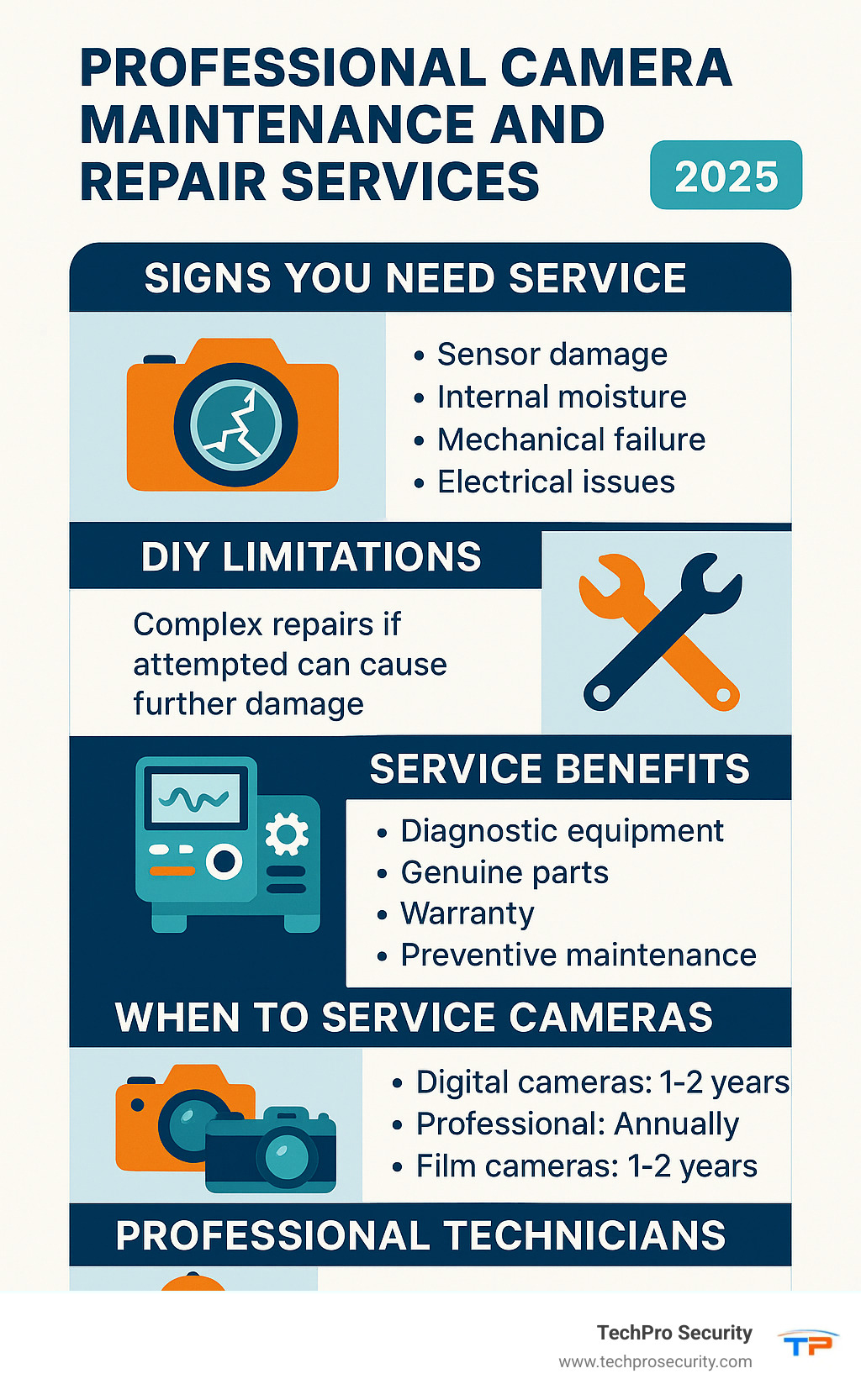
Frequently Asked Questions about Camera Care
How often should I clean my camera’s sensor?
Your camera’s sensor doesn’t need cleaning as often as you might think. The best rule of thumb is to clean it only when you actually see dust spots appearing in your photos. For most photographers, this happens every few months, but it really depends on how often you change lenses and where you’re shooting.
When to Clean Your Sensor:
If you’re shooting in dusty environments like construction sites or beaches, you’ll need to clean more frequently. Studio photographers who rarely change lenses might go six months or longer between cleanings. Always check your camera’s manual for specific recommendations, as some manufacturers have different guidelines.
Professional vs. DIY Cleaning:
You can clean your sensor yourself using your camera’s sensor cleaning mode and proper sensor swabs. However, if you’re working with expensive equipment or feel uncomfortable doing it yourself, professional cleaning is worth the investment. Most camera shops offer sensor cleaning services for around $50-75.
The key is being gentle and using the right tools. Never touch the sensor directly with your fingers, and always use cleaning solutions specifically designed for camera sensors.
What common issues can regular maintenance prevent?
Following a proper camera maintenance checklist can save you from countless headaches and expensive repairs. We’ve seen too many situations where a simple cleaning routine could have prevented major problems.
Image Quality Problems:
Dirty lenses are the most common culprit behind blurry or spotted images. When dust builds up on your lens or IR illuminators, your night vision footage becomes practically useless. Even worse, damaged lens coatings from improper cleaning can cause permanent color distortion that requires expensive lens replacement.
System Failures:
Recording failures often stem from storage issues that regular maintenance catches early. Corroded cables cause connection loss, especially in South Florida’s humid climate. Battery degradation is another silent killer – cameras that worked fine yesterday suddenly stop recording because nobody checked the power levels.
Security Vulnerabilities:
Outdated firmware creates security holes that hackers can exploit. Default passwords are like leaving your front door open uped. Misaligned cameras create coverage gaps that defeat the entire purpose of your security system.
Equipment Damage:
Moisture damage from failed seals is expensive to repair and often preventable. Salt air exposure in coastal areas causes corrosion that spreads quickly if not addressed. Mechanical wear from lack of lubrication can destroy moving parts in PTZ cameras.
Regular maintenance isn’t just about keeping things clean – it’s about protecting your investment and ensuring your security system works when you need it most.
Can I use household cleaners on my camera lens?
Never use household cleaners on your camera equipment. This is one of the most common mistakes we see, and it can permanently damage your lenses.
Why Household Cleaners Are Dangerous:
Ammonia-based cleaners like Windex can strip away the delicate anti-reflective coatings on your lenses. These coatings are incredibly thin and designed to improve image quality. Once they’re damaged, you’ll notice reduced contrast and increased glare that can’t be fixed without replacing the lens.
Alcohol-based products might seem safe, but they can also damage protective layers over time. Even paper towels and tissues are too abrasive for optical surfaces and can create microscopic scratches.
The Right Way to Clean:
Use only cleaning solutions specifically designed for camera optics. Microfiber cloths made for cameras are essential – they’re lint-free and won’t scratch your lenses. Lens pens are perfect for field cleaning when you need quick touch-ups.
Safe Cleaning Steps:
Start by blowing off loose dust with an air blower. Apply your lens cleaning solution to the microfiber cloth, never directly to the lens. Clean in gentle circular motions from the center outward. Use a fresh section of cloth for the final polish.
This gentle approach takes a few extra minutes, but it protects your equipment and ensures crystal-clear images for years to come. Your camera maintenance checklist should always include proper cleaning supplies – it’s a small investment that prevents costly lens replacements.
Conclusion
Taking care of your cameras doesn’t have to be complicated, but it does need to be consistent. A solid camera maintenance checklist is like having a good friend who reminds you to take care of the things that matter most—whether that’s the security cameras protecting your Miami Beach home or the DSLR that captures your family’s precious moments.
The Bottom Line on Maintenance
Think of maintenance as an investment, not an expense. When you follow a frequency-based maintenance schedule, you’re essentially buying yourself peace of mind. Daily and weekly checks keep small problems from becoming big headaches, while monthly and quarterly tasks ensure your equipment stays reliable for years to come.
Your Equipment is Worth Protecting
Here’s something that might surprise you: regular maintenance typically costs just $50-$200 per camera annually for most systems. Compare that to replacing a damaged camera or dealing with a security breach because your system failed when you needed it most. The math is pretty clear—prevention wins every time.
When to Go Professional
While you can handle most maintenance tasks yourself, don’t hesitate to call in the experts when things get complicated. Professional maintenance becomes especially important for businesses throughout South Florida, from Aventura to Homestead, where security can’t afford to take a day off.
Making It Work for You
The key to successful camera maintenance is finding a rhythm that works with your lifestyle. Document your maintenance activities to keep warranties valid, and adapt your schedule based on your environment. Coastal properties need more frequent attention due to salt air, while indoor cameras can go longer between deep cleanings.
Your Next Steps
Start small if you need to. Pick one day a week for quick visual checks, and gradually build up your routine. Whether you’re protecting your business with a commercial security system or keeping family memories safe with your personal camera, consistency beats perfection every time.
For professional installation and ongoing support throughout South Florida, our team at TechPro Security offers comprehensive security camera installation services with the warranties and US-based support you deserve.
Your cameras are only as good as the care you give them. Start your maintenance routine today, and you’ll be protecting your investment—and your peace of mind—for years to come.

